Lasswell Harold D. The Political Writings of Harold D. Lasswell
Подождите немного. Документ загружается.

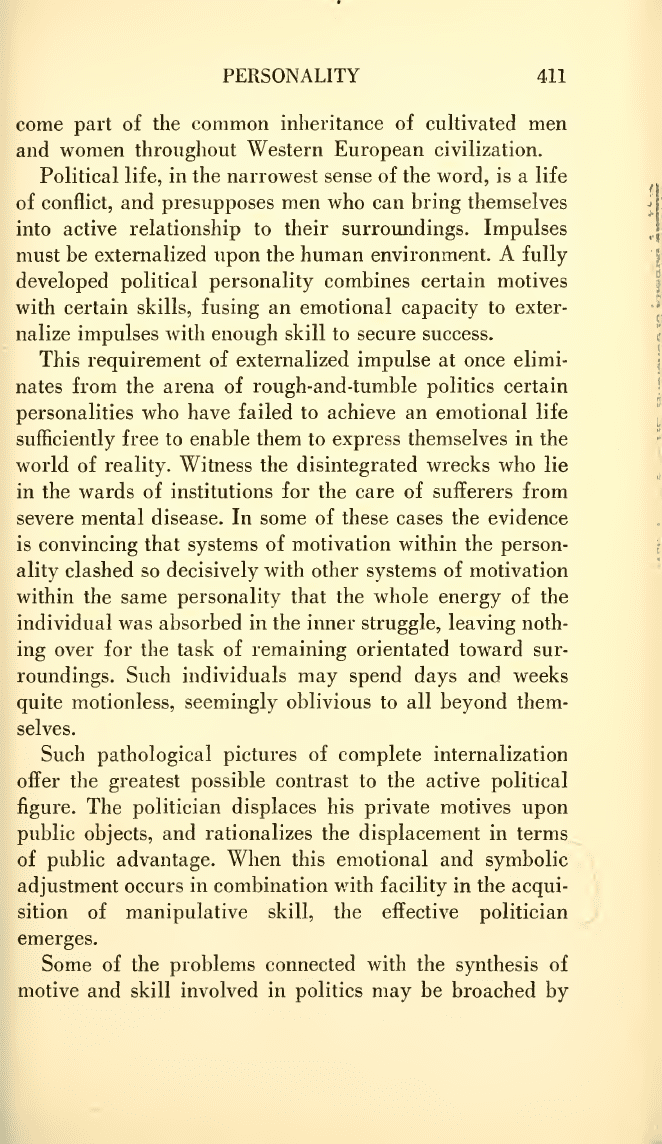
PERSONALITY
411
come
part of
the
common inheritance
of
cukivated men
and
women throughout Western
European civilization.
Political life, in the narrowest
sense
of the
word,
is a life
of
conflict, and presupposes men who can
bring themselves
into active
relationship to
their surroundings. Impulses
must
be externalized upon the human
environment. A fully
developed political
personality combines certain motives
with certain skills,
fusing
an
emotional capacity
to
exter-
nalize impulses with enough
skill
to
secure
success.
This requirement of
externalized
impulse at once
elimi-
nates
from the arena of
rough-and-tumble politics certain
personalities who have failed to achieve an emotional
life
sufficiently free to enable them
to
express
themselves in the
world of
reality. Witness the disintegrated wrecks who
lie
in the wards of
institutions for the care of sufferers
from
severe mental disease. In
some of these cases the
evidence
is convincing that
systems
of
motivation
within the person-
ality clashed so decisively
with other systems
of motivation
within the same
personality
that
the whole energy
of the
individual was absorbed in the
inner
struggle, leaving noth-
ing over for the task of
remaining
orientated toward sur-
roundings. Such individuals may spend days and weeks
quite motionless, seemingly
oblivious
to all beyond them-
selves.
Such pathological pictures of complete internalization
offer the greatest possible contrast to the active political
figure. The politician displaces his private motives upon
public objects, and
rationalizes
the
displacement
in terms
of public advantage.
When this emotional and
symbolic
adjustment occurs
in combination with facility
in
the
acqui-
sition
of
manipulative skill, the effective
politician
j
emerges.
Some of the
problems connected with the synthesis
of
motive
and skill involved in
politics
may be broached by
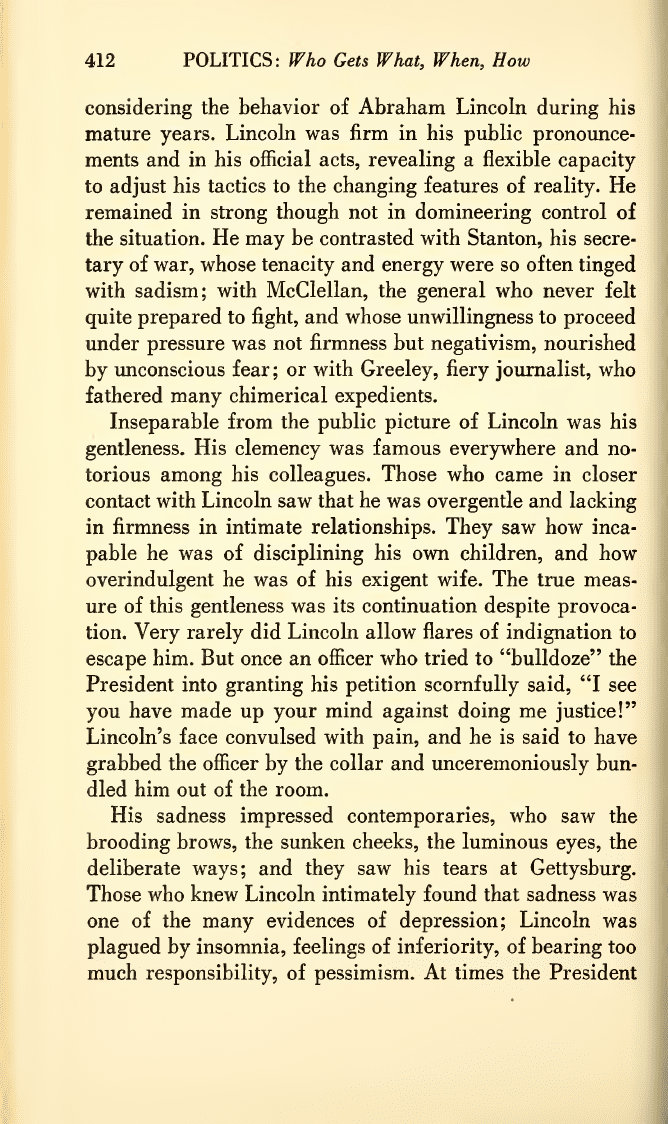
412
POLITICS: Who Gets What, When, How
considering the
behavior
of
Abraham Lincoln
during his
mature years.
Lincoln was firm in his public pronounce-
ments
and in his
official acts,
revealing a flexible capacity
to adjust
his tactics to
the changing
features of reality. He
remained in strong
though not
in
domineering
control
of
the
situation. He may be contrasted with Stanton, his
secre-
tary of
war,
whose
tenacity and energy were
so
often tinged
with
sadism; with
McClellan,
the general who never
felt
quite prepared
to
fight, and
whose unwillingness to proceed
under pressure was not
firmness
but negativism, nourished
by
unconscious fear;
or with Greeley, fiery
journalist, who
fathered many chimerical
expedients.
Inseparable
from the
public picture
of Lincoln was his
gentleness.
His clemency
was
famous
everywhere and
no-
torious among his colleagues.
Those
who came in closer
contact
with Lincoln
saw that he was
overgentle
and lacking
in
firmness in intimate relationships. They saw how inca-
pable he was of disciplining his own children, and how
overindulgent he was of his
exigent
wife. The true meas-
ure
of this gentleness was
its continuation despite
provoca-
tion. Very rarely did
Lincoln allow flares of
indignation
to
escape
him.
But
once
an
ofiicer who tried to "bulldoze"
the
President into
granting
his
petition scornfully said,
"I
see
you have made up
your mind against doing
me justice!"
Lincoln's face convulsed
with pain, and
he is said to have
grabbed the officer
by
the collar and unceremoniously
bun-
dled
him out
of
the room.
His sadness impressed contemporaries, who
saw the
brooding brows, the sunken cheeks, the
luminous
eyes, the
deliberate ways; and they saw
his
tears at Gettysburg.
Those who knew Lincoln
intimately found that
sadness was
one
of
the many
evidences of depression; Lincoln
was
plagued by insomnia, feelings of
inferiority,
of bearing too
much responsibility, of
pessimism. At times the President
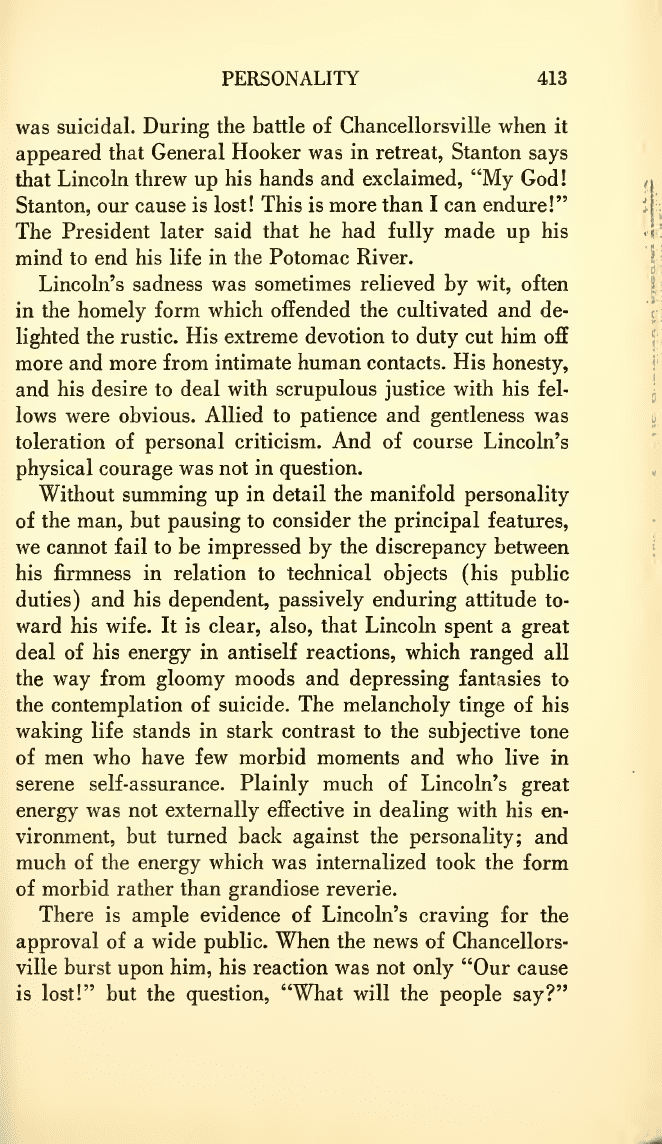
PERSONALITY
413
was
suicidal.
During
the battle of
Chancellorsville
when
it
appeared
that General
Hooker
was
in retreat, Stanton
says
that
Lincoln threw up
his hands and
exclaimed,
"My
God!
Stanton,
our cause is
lost! This is more than
I
can
endure!"
The
President
later said that he had
fully
made up his
mind to
end his life
in the Potomac River.
Lincoln's sadness was
sometimes relieved by wit, often
in the
homely form
which offended the cultivated and
de-
lighted the rustic.
His extreme devotion to duty cut him
off
more
and more
from intimate human contacts.
His
honesty,
and
his desire to deal
with
scrupulous
justice with his
fel-
lows were obvious. Allied
to patience and gentleness
was
toleration of personal
criticism. And of course
Lincoln's
physical
courage was not
in question.
Without summing up in detail
the manifold
personality
of the
man, but
pausing
to
consider the principal
features,
we
cannot
fail to
be
impressed by the discrepancy
between
his firmness
in relation to technical objects
(his public
duties) and
his dependent, passively enduring
attitude
to-
ward his wife. It is
clear, also, that Lincoln
spent
a great
deal of
his energy
in
antiself reactions,
which ranged
all
the way from gloomy moods
and depressing
fantasies
to
the contemplation of
suicide. The
melancholy tinge
of his
waking life stands in
stark contrast
to the subjective
tone
of men who have few morbid moments and who
live
in
serene self-assurance.
Plainly
much of Lincoln's
great
energy was not
externally effective
in dealing with
his
en-
vironment, but turned
back against
the personality;
and
much of the
energy which was internalized
took the
form
of morbid
rather than
grandiose reverie.
There is ample evidence of
Lincoln's
craving
for the
approval
of a
wide public.
When the
news
of Chancellors-
ville burst upon him, his reaction was not only
"Our
cause
is lost!" but
the
question, "What will the
people
say?"
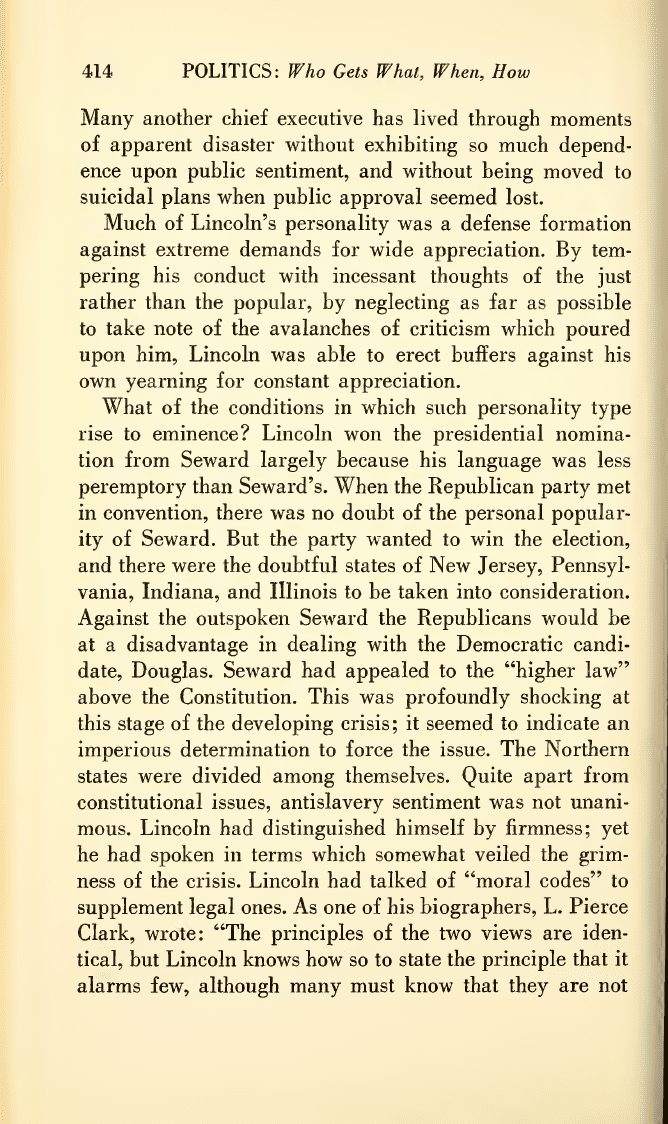
414
POLITICS: Who
Gets What, When, How
Many
another
chief executive has lived
through
moments
of apparent disaster without exhibiting
so much
depend-
ence upon public sentiment, and without
being
moved to
suicidal
plans when public approval
seemed lost.
Much of
Lincoln's
personality was
a defense formation
against extreme
demands for wide appreciation.
By tem-
pering his conduct with
incessant thoughts
of the just
rather than the popular, by neglecting
as
far
as possible
to
take note
of the avalanches of criticism which
poured
upon him, Lincoln was able
to
erect buffers against
his
own
yearning
for constant appreciation.
What of the conditions in which such personality
type
rise to eminence? Lincoln won the presidential
nomina-
tion from Seward
largely
because his language was less
peremptory than Seward's. When the Republican party met
in convention, there was no doubt of the personal popular-
ity
of
Seward. But the party wanted
to
win the election,
and
there were
the
doubtful states
of
New
Jersey,
Pennsyl-
vania, Indiana,
and Illinois
to be
taken
into
consideration.
Against the outspoken Seward the Republicans
would
be
at a disadvantage in dealing with the Democratic
candi-
date, Douglas. Seward had appealed to the
"higher
law"
above
the Constitution. This was profoundly
shocking
at
this stage of the developing crisis; it seemed to
indicate an
imperious determination to force the issue. The
Northern
states were divided among themselves.
Quite apart from
constitutional issues,
antislavery sentiment
was
not unani-
mous. Lincoln had
distinguished himself
by
firmness; yet
he
had spoken in terms
which somewhat veiled the grim-
ness of the crisis.
Lincoln
had
talked of "moral codes" to
supplement legal ones.
As one of his
biographers, L. Pierce
Clark,
wrote: "The
principles of the two
views
are
iden-
tical,
but Lincoln
knows
how so
to state the
principle that it
alarms
few, although
many must know that
they are not
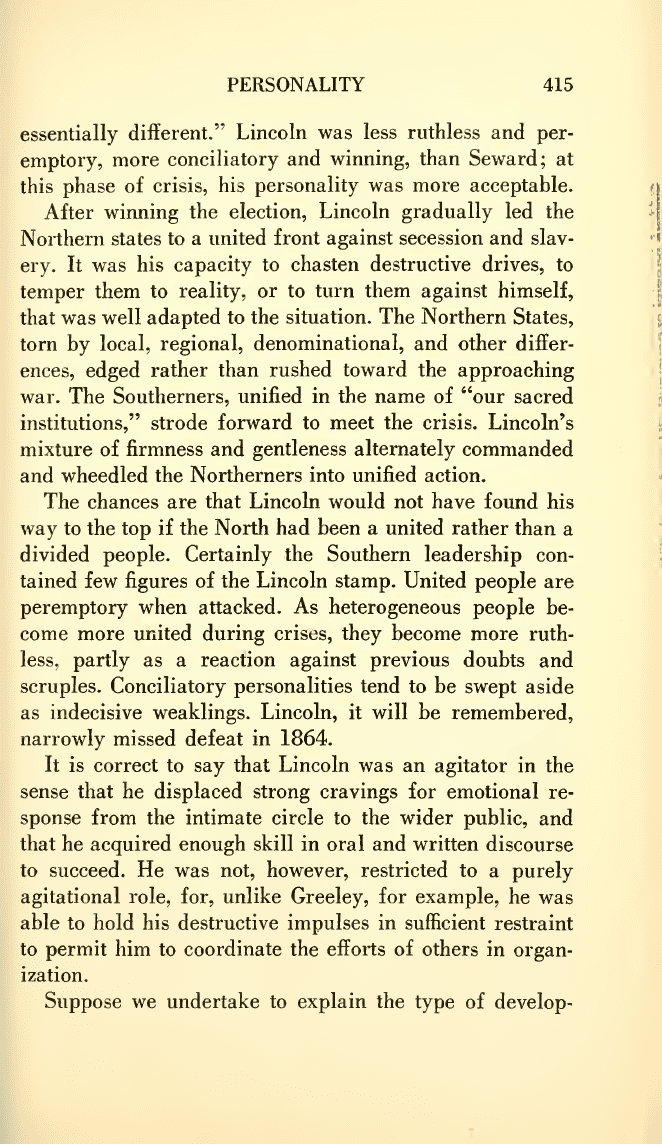
PERSONALITY
415
essentially
different."
Lincoln was less
ruthless
and per-
emptory,
more
conciliatory
and
winning,
than Seward;
at
this
phase
of crisis,
his
personality was more acceptable.
After
winning
the election,
Lincoln gradually
led the
Northern
states
to a
united front against
secession
and slav-
ery. It
was
his capacity to
chasten destructive drives,
to
temper
them to
reality, or to
turn them
against himself,
that was well
adapted to the
situation. The Northern
States,
torn
by
local,
regional,
denominational, and
other differ-
ences, edged
rather than
rushed toward
the approaching
war.
The
Southerners, unified in
the
name of
"our sacred
institutions," strode
forward to meet the crisis.
Lincoln's
mixture of firmness and
gentleness alternately
commanded
and
wheedled the Northerners
into unified action.
The chances
are that
Lincoln
would not have
found his
way to the top if the
North had been a united rather
than
a
divided
people. Certainly
the
Southern
leadership
con-
tained few figures of the
Lincoln stamp.
United
people are
peremptory when attacked.
As
heterogeneous people
be-
come more united during crises, they become
more ruth-
less,
partly as a reaction
against previous
doubts
and
scruples.
Conciliatory
personalities tend
to be swept
aside
as indecisive weaklings. Lincoln,
it
will
be remembered,
narrowly
missed defeat
in 1864.
It
is
correct
to say that
Lincoln
was an agitator
in the
sense that he displaced strong
cravings
for emotional
re-
sponse
from the intimate circle to the wider public,
and
that
he acquired enough
skill
in oral and written
discourse
to succeed. He was not, however, restricted to
a purely
agitational
role,
for, unlike
Greeley, for example,
he
was
able
to hold
his
destructive impulses in
sufficient
restraint
to permit
him to
coordinate
the
efforts of
others
in organ-
ization.
Suppose
we undertake to
explain the
type
of develop-
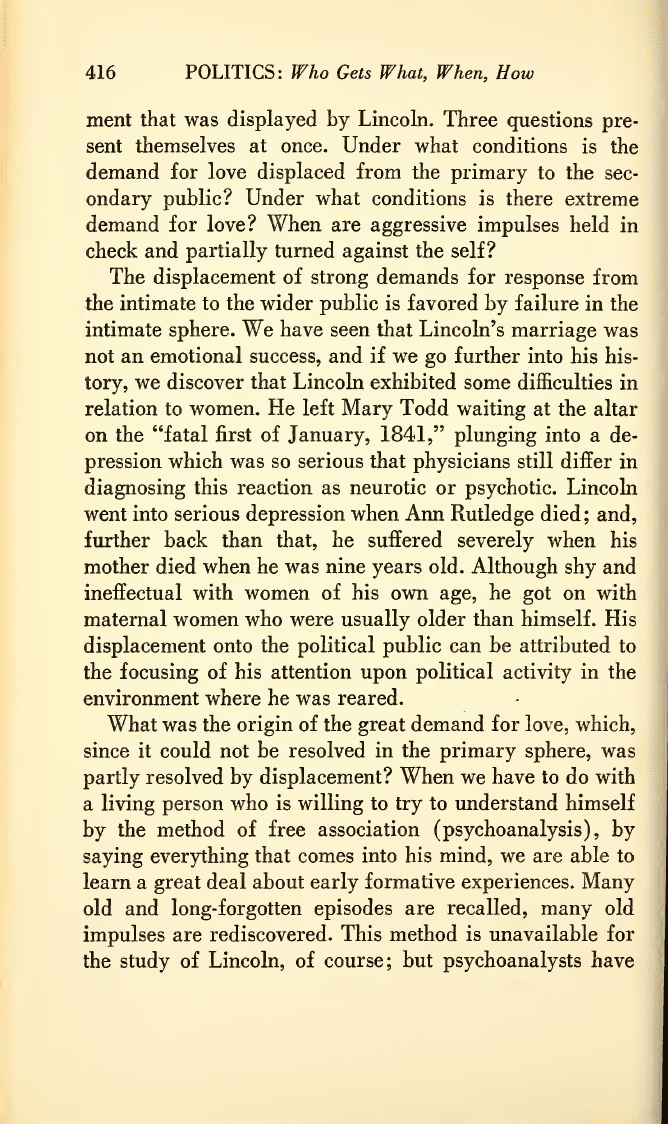
416
POLITICS: Who
Gets
What,
When,
How
merit
that was displayed by Lincoln.
Three
questions
pre-
sent
themselves at once. Under
what conditions
is the
demand
for love displaced from the
primary
to the
sec-
ondary
public? Under what conditions
is there
extreme
demand for
love?
When are aggressive
impulses
held
in
check
and
partially
turned against the self?
The
displacement of strong demands
for response
from
the
intimate to the wider public
is
favored
by failure
in the
intimate sphere. We have seen that Lincoln's
marriage
was
not an
emotional success, and if we
go further into
his his-
tory, we
discover that Lincoln exhibited
some difficulties
in
relation to
women. He left Mary Todd waiting
at
the altar
on the "fatal
first of
January,
1841,"
plunging
into
a de-
pression which was so
serious
that physicians still differ
in
diagnosing this reaction as neurotic or psychotic.
Lincoln
went
into serious depression when Ann Rutledge
died
;
and,
further back
than that, he suffered severely
when his
mother died when he
was nine
years old. Although shy
and
ineffectual with women of his own age, he got on with
maternal women who were usually older than himself. His
displacement
onto the political public can be attributed to
the focusing of
his attention upon political activity in the
environment
where he
was
reared.
What was the
origin of the great demand for love, which,
since it could not be
resolved in the primary sphere, was
partly resolved by
displacement? When
we
have to
do
with
a
living person
who is willing to try to understand himself
by
the method of
free association (psychoanalysis),
by
saying
everything that comes
into his mind,
we
are able
to
learn a
great deal about early
formative experiences. Many
old and
long-forgotten episodes
are recalled, many old
impulses are rediscovered.
This method is unavailable for
the
study of Lincoln,
of course; but
psychoanalysts
have
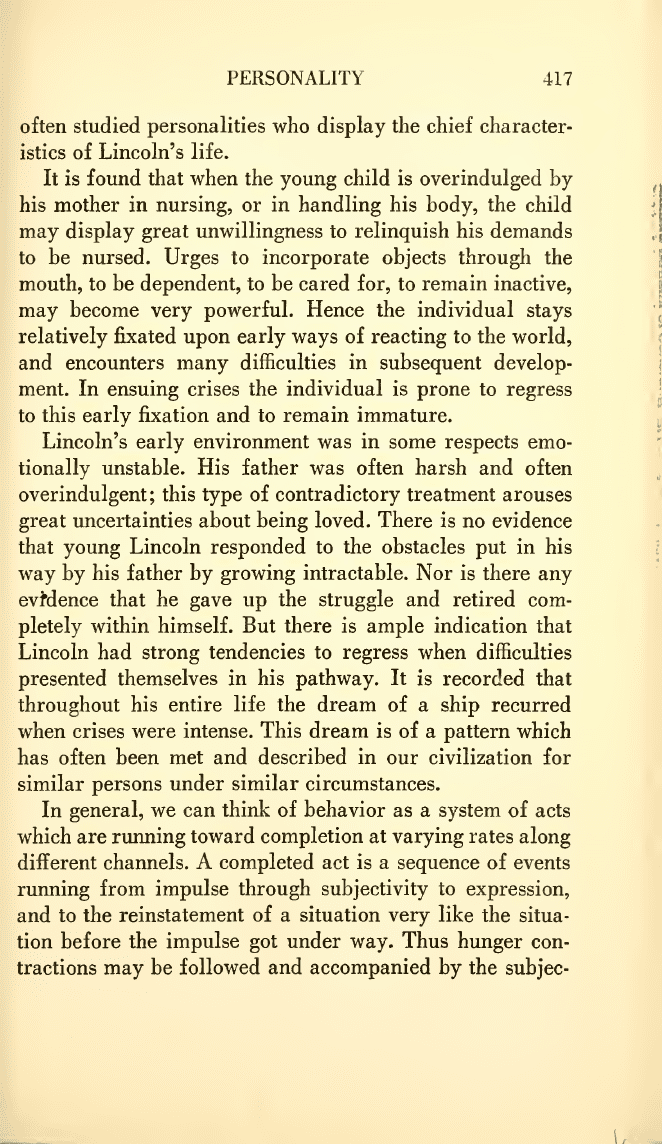
PERSONALITY
417
often
studied
personalities
who
display the chief
character-
istics of
Lincoln's life.
It is
found that when the young child is overindulged
by
his mother in nursing, or in handling his body, the
child
may
display great unwillingness
to
relinquish his
demands
to be
nursed. Urges
to
incorporate objects through
the
mouth, to be
dependent, to
be
cared for,
to
remain
inactive,
may become very powerful.
Hence
the individual
stays
relatively fixated upon
early
ways of
reacting
to the world,
and encounters many
difficulties
in subsequent develop-
ment. In ensuing crises the individual is prone to
regress
to
this early fixation and to remain
immature.
Lincoln's early environment was in some respects
emo-
tionally unstable. His father was often harsh and
often
overindulgent; this
type of
contradictory treatment
arouses
great uncertainties
about
being
loved.
There
is no evidence
that young Lincoln
responded
to
the
obstacles put
in
his
way
by
his father by growing
intractable.
Nor is there
any
evidence that he gave up the struggle and retired
com-
pletely within himself. But
there
is ample indication
that
Lincoln had
strong tendencies to regress when difficulties
presented
themselves in his pathway. It
is recorded that
throughout
his entire life the dream of
a
ship
recurred
when crises
were intense. This dream
is of a pattern which
has
often been
met and described in
our
civilization
for
similar persons
under similar circumstances.
In
general, we
can think of behavior
as a system of
acts
which are
running toward completion at varying rates
along
different channels.
A completed act is a sequence
of events
running from
impulse through
subjectivity
to expression,
and
to
the
reinstatement of a situation
very
like
the situa-
tion before the
impulse got under way.
Thus
hunger
con-
tractions
may be
followed
and accompanied
by the
subjec-
C
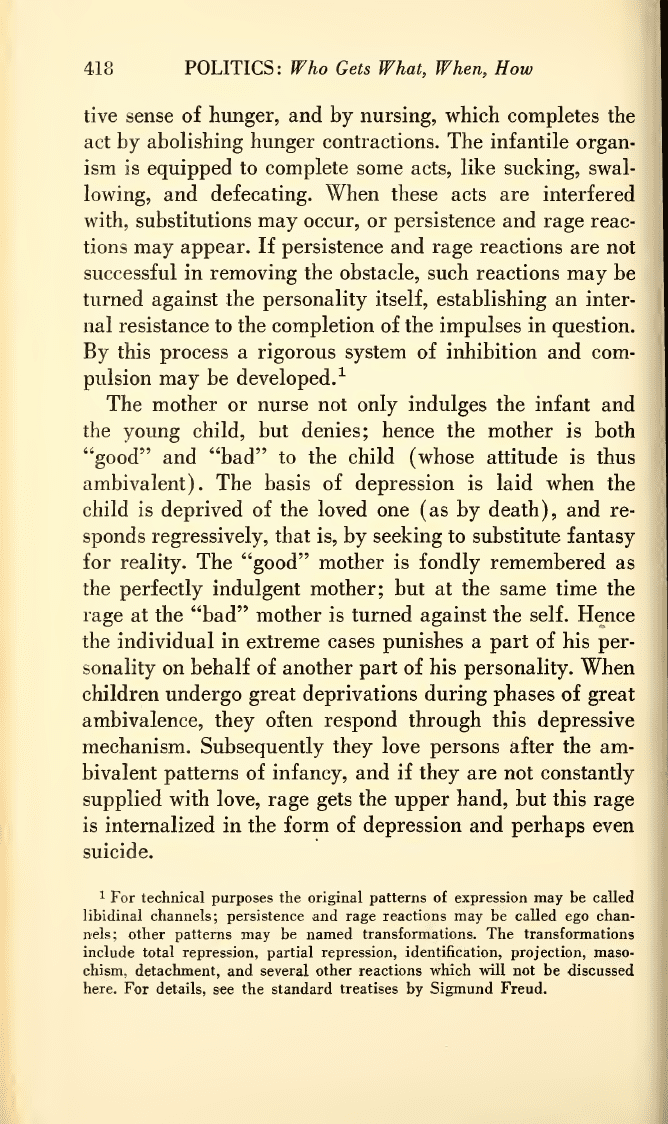
418 POLITICS:
Who
Gets What, When, How
live sense of
hunger, and
by
nursing,
which completes
the
act by
abolishing hunger contractions.
The infantile organ-
ism is equipped to
complete some
acts,
like sucking,
swal-
lowing, and
defecating. When these
acts
are
interfered
with, substitutions may occur, or persistence
and rage reac-
tions
may
appear. If persistence
and
rage reactions
are
not
successful in
removing the
obstacle, such reactions may
be
turned against the
personality itself,
establishing an inter-
nal resistance to
the completion
of
the
impulses in question.
By this process a
rigorous system
of inhibition and com-
pulsion may be developed.^
The
mother
or nurse not
only
indulges the infant and
the young child, but denies; hence the mother
is
both
"good" and
"bad"
to the child (whose attitude
is thus
ambivalent). The basis of depression
is
laid
when the
child
is
deprived of the loved one
(as by death), and
re-
sponds
regressively, that
is, by
seeking
to substitute fantasy
for
reality. The "good" mother is
fondly
remembered
as
the perfectly indulgent
mother;
but at the same time the
rage at the "bad" mother is
turned
against
the
self. Hence
the individual in extreme cases punishes
a
part of his
per-
sonality on behalf
of
another part
of
his personality.
When
children
undergo great deprivations during phases
of great
ambivalence, they
often respond through this depressive
mechanism.
Subsequently they love persons after
the am-
bivalent
patterns
of
infancy, and if they are
not constantly
supplied with love, rage
gets the upper hand,
but this rage
is
internalized
in the
form
of
depression and perhaps even
suicide.
^
For technical purposes
the original patterns of expression may
be
called
libidinal channels; persistence
and rage
reactions may be called
ego
chan-
nels; other patterns may be named
transformations. The transformations
include total repression,
partial
repression, identification, projection,
maso-
chism, detachment,
and several
other reactions which
will
not be discussed
here.
For details, see the standard
treatises
by
Sigmund Freud.
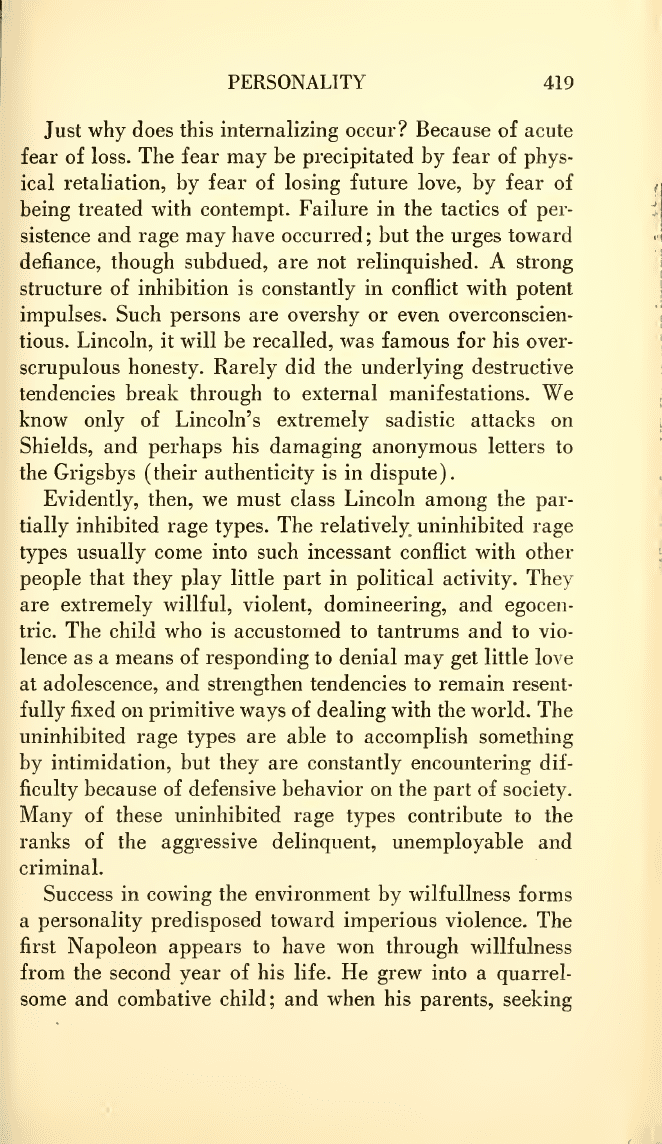
PERSONALITY
419
Just
why does this
internalizing occur? Because
of acute
fear of loss.
The fear may be
precipitated
by
fear
of phys-
ical
retaliation, by fear of losing future love, by fear of
being
treated with contempt. Failure in the tactics
of
per-
sistence and
rage may
have
occurred
;
but
the
urges toward
defiance, though subdued,
are
not
relinquished.
A strong
structure of inhibition is constantly in conflict with potent
impulses. Such persons are overshy
or
even overconscien-
tious.
Lincoln,
it
will
be
recalled, was famous
for his over-
scrupulous
honesty.
Rarely did the underlying
destructive
tendencies break
through
to
external
manifestations. We
know only of Lincoln's extremely sadistic attacks on
Shields, and perhaps his damaging anonymous letters
to
the Grigsbys (their
authenticity
is in dispute).
Evidently, then, we must class Lincoln among the par-
tially inhibited
rage types.
The relatively uninhibited
rage
types usually come into such incessant conflict with other
people that they
play
little part in political activity. They
are extremely willful, violent, domineering,
and
egocen-
tric. The child
who
is accustomed
to
tantrums
and to vio-
lence as a means of
responding
to denial may get little love
at adolescence, and
strengthen
tendencies to remain resent-
fully fixed on primitive ways of dealing with the
world.
The
uninhibited rage types are able to accomplish something
by intimidation, but they are constantly encountering
dif-
ficulty
because
of defensive behavior
on
the part
of society.
Many of
these
uninhibited rage types contribute
to the
ranks
of the
aggressive delinquent, unemployable
and
criminal.
Success
in cowing the environment
by
wilfullness
forms
a
personality predisposed toward imperious
violence.
The
first
Napoleon
appears
to have
won
through
willfulness
from
the second year
of his
life. He grew into
a quarrel-
some
and combative
child; and
when his parents,
seeking
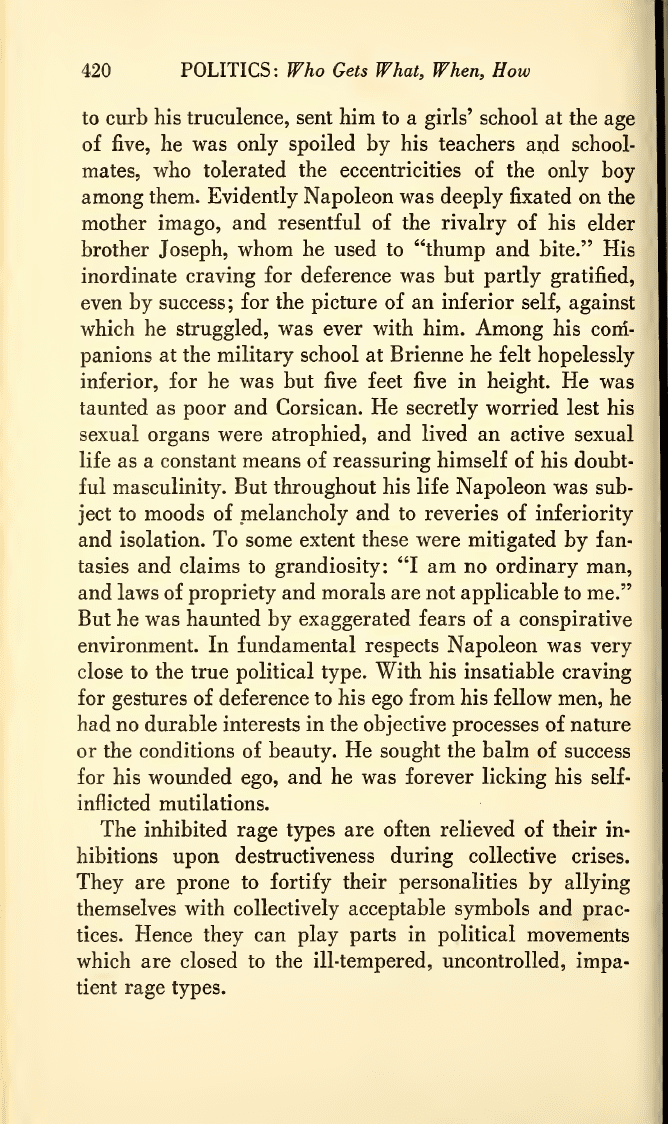
420
POLITICS: Who Gets What, When,
How
to curb
his truculence, sent him to
a
girls'
school at the
age
of live,
he
was
only spoiled by his teachers
and
school-
mates, who
tolerated the eccentricities
of the only
boy
among
them.
Evidently
Napoleon was deeply fixated
on the
mother
imago, and
resentful
of the rivalry
of
his
elder
brother Joseph,
whom he used to "thump
and bite." His
inordinate
craving for deference was
but partly gratified,
even by
success; for the picture of an inferior
self, against
which he
struggled, was ever with him. Among
his com-
panions at the
military school
at
Brienne
he felt hopelessly
inferior, for he was but five feet five in height.
He was
taunted as poor and Corsican.
He secretly
worried lest his
sexual organs were atrophied, and lived an active sexual
life
as a
constant means of reassuring himself
of his doubt-
ful masculinity. But
throughout his life
Napoleon was
sub-
ject to moods
of melancholy and to reveries of inferiority
and isolation. To
some extent these were mitigated
by fan-
tasies and claims to
grandiosity: *'I am
no
ordinary
man,
and laws of
propriety and morals are not applicable
to
me."
But he was
haunted by exaggerated fears
of a
conspirative
environment. In
fundamental respects Napoleon
was very
close to the true political type.
With
his insatiable craving
for gestures
of
deference to his ego from his fellow men,
he
had no durable interests in the objective processes
of
nature
or
the
conditions
of beauty.
He sought the balm
of success
for his wounded ego, and he was
forever licking
his self-
inflicted mutilations.
The inhibited rage types
are often relieved
of their
in-
hibitions upon destructiveness
during
collective crises.
They
are prone to
fortify their personalities
by allying
themselves
with
collectively
acceptable symbols
and prac-
tices. Hence they can
play parts in political
movements
which are closed to
the ill-tempered, uncontrolled, impa-
tient rage
types.
